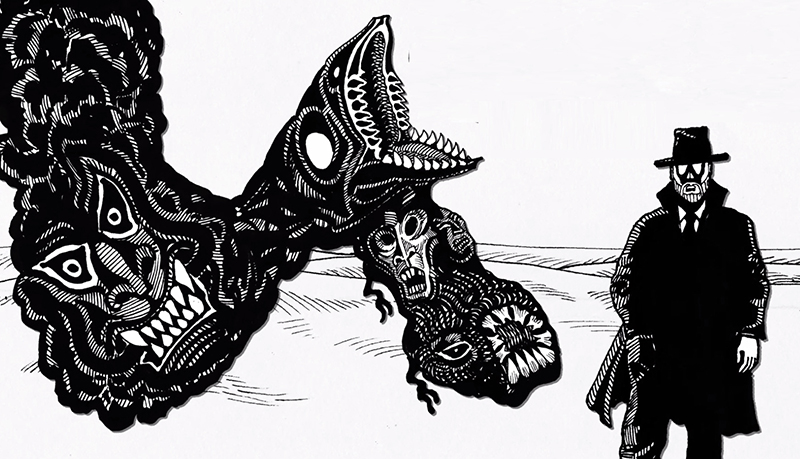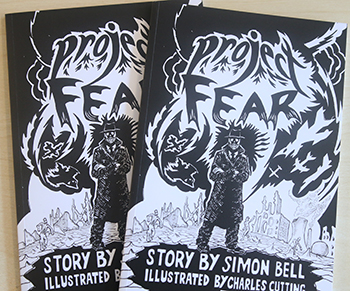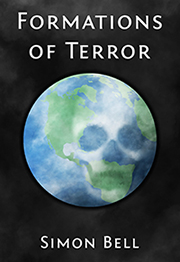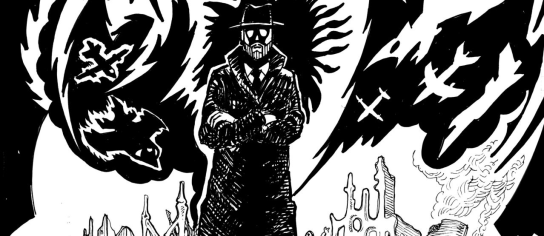 Morpheus, Phobetor and Phantasos – Gods of dreams, fears and phantasies... Why the Greek gods continue to inspire is a mystery? Perhaps they are timeless and speak to us about our universal experience of human frailties? Whatever the reason for their lasting fascination, we all have fears and we all know what it is to be fearful.
Morpheus, Phobetor and Phantasos – Gods of dreams, fears and phantasies... Why the Greek gods continue to inspire is a mystery? Perhaps they are timeless and speak to us about our universal experience of human frailties? Whatever the reason for their lasting fascination, we all have fears and we all know what it is to be fearful.
Academics are no exceptions to this harsh rule but in 2013 I had had enough of fear. I wanted to get to know about it and understand it. So, I began to read about the things that frighten us. Although I looked at lots of scary things what I was really looking for was a means to deal with fear. Now, there are lots of books about fear – what it is, how it is experienced in politics, philosophy and art, how to stop being fearful and push back with wellbeing, and lots of examples of fear in historical and cultural contexts. But not what I was looking for. I wanted to understand fear in terms of a process to manage the experience and deal with it. I wanted to understand in methodological terms – in systemic methodological terms. I also wanted to understand fear across boundaries - be they medical, psychological, cultural, historical, political, etc. I was concerned to know what is the basis of the fear phenomena and how can we push back?
So reluctantly at first, I decided to undertake research into fear. Yes, people did think me a bit odd. My main area of interest at the time was climate change so I used that as my point of focus but I was quite clear with myself – my research was about fear in general with climate change fear as a lens.
To make my research real and to some extent to force me to treat it as a bit more than a personal thought experiment I approached a publishing house – Cambridge Scholars – hoping that they would support my research by means of a book contract. I hit gold, Cambridge said yes but I now had the added pressure of a book contract and a handover date to make me move my research along.
Between 2014 and 2016 I researched fear – still hoping in a way to find the book that I was beginning to write – so I would not have to. But, despite wide reading of many excellent books (and I am sure that there are many more excellent books I have not read on the subject but the genre is huge) and despite talking to lots of fear experts, I did not find the systems methods account of fear I was looking for so my research progressed and so did my book.
On reflection, I found researching and writing about fear – from the personal to the planetary – exhausting and scary. I had to go into some areas which I found personally worrisome and at times found myself anxious and fearful. Fear was not easy to tie down and studying it meant looking at how it emerged and what it did up close and personal. The book also changed in the writing. What began as an academic account changed to a mixture of academic text and autobiography! But, in March 2017 I had accomplished my task and my book: Formations of Terror was published.
 Project Fear comic books
The book was done but I was not satisfied. An academic book was a good place to set out my journey in detail but this is a very specialised product and I wanted to ‘reach out’ beyond those who might buy an academic text on fear methodology. Let’s face it, there are not many people standing in that queue. It seemed to me that fear was our common, human legacy and that there was a lot of it about in 2015 – 2016 with Brexit and Trump coming into view. So, I approached my University – The Open University – for the funding to approach an artist and make a graphic novel version of the main book. I was successful and, working alongside Charles Cutting, ‘Project Fear’ was produced. But I was still not satisfied. I also wanted to make an animation of fear – outreach from the comic outreach! Charles came to the rescue again with wonderful images and, following the excellent video production of Damn Fine Media the animation on this site emerged. Book, comic and animation. The fear collection.
Project Fear comic books
The book was done but I was not satisfied. An academic book was a good place to set out my journey in detail but this is a very specialised product and I wanted to ‘reach out’ beyond those who might buy an academic text on fear methodology. Let’s face it, there are not many people standing in that queue. It seemed to me that fear was our common, human legacy and that there was a lot of it about in 2015 – 2016 with Brexit and Trump coming into view. So, I approached my University – The Open University – for the funding to approach an artist and make a graphic novel version of the main book. I was successful and, working alongside Charles Cutting, ‘Project Fear’ was produced. But I was still not satisfied. I also wanted to make an animation of fear – outreach from the comic outreach! Charles came to the rescue again with wonderful images and, following the excellent video production of Damn Fine Media the animation on this site emerged. Book, comic and animation. The fear collection.
My hope is that you will find the animation interesting and maybe provocative. This may induce you to take a look at the comic. If you find this interesting then you may feel inclined to read the Formations of Terror – and learn more about my learning journey. Of course you may do it the other way around. It’s up to you. At whatever point you decide to begin and end your journey I wish you insights on the way.
The ancient Greeks understood that by making up stories – fictions, by the personification of forces which affect our lives we have a chance to gain control over these forces. Morpheus, Phobetor and Phantasos are as relevant today as they were thousands of years ago. They represent forces which are interfering with human lives as never before. I am personally convinced that fear is a weapon which is consciously used on populations in order to achieve very specific ends. The more we understand the fear process, the more we are able to push back against it and those who wield it. For me, my research and learning journey are still in progress. I hope to have more to say in the coming months and years.
 Project Fear is based on Professor Simon Bell's recent book Formations of Terror. It is published by Cambridge Schorlars Publishing on March 2017. You can buy a copy from their website directly.
Project Fear is based on Professor Simon Bell's recent book Formations of Terror. It is published by Cambridge Schorlars Publishing on March 2017. You can buy a copy from their website directly.
To celebrate and support the launch of Project Fear on OpenLearn, Cambridge Scholars Publishing is offering OpenLearn users 20% discount for six months until the end of the year. You can redeem this discount by entering the code 'terror20' on the My Order page before proceeding through check out.

Rate and Review
Rate this article
Review this article
Log into OpenLearn to leave reviews and join in the conversation.
Article reviews